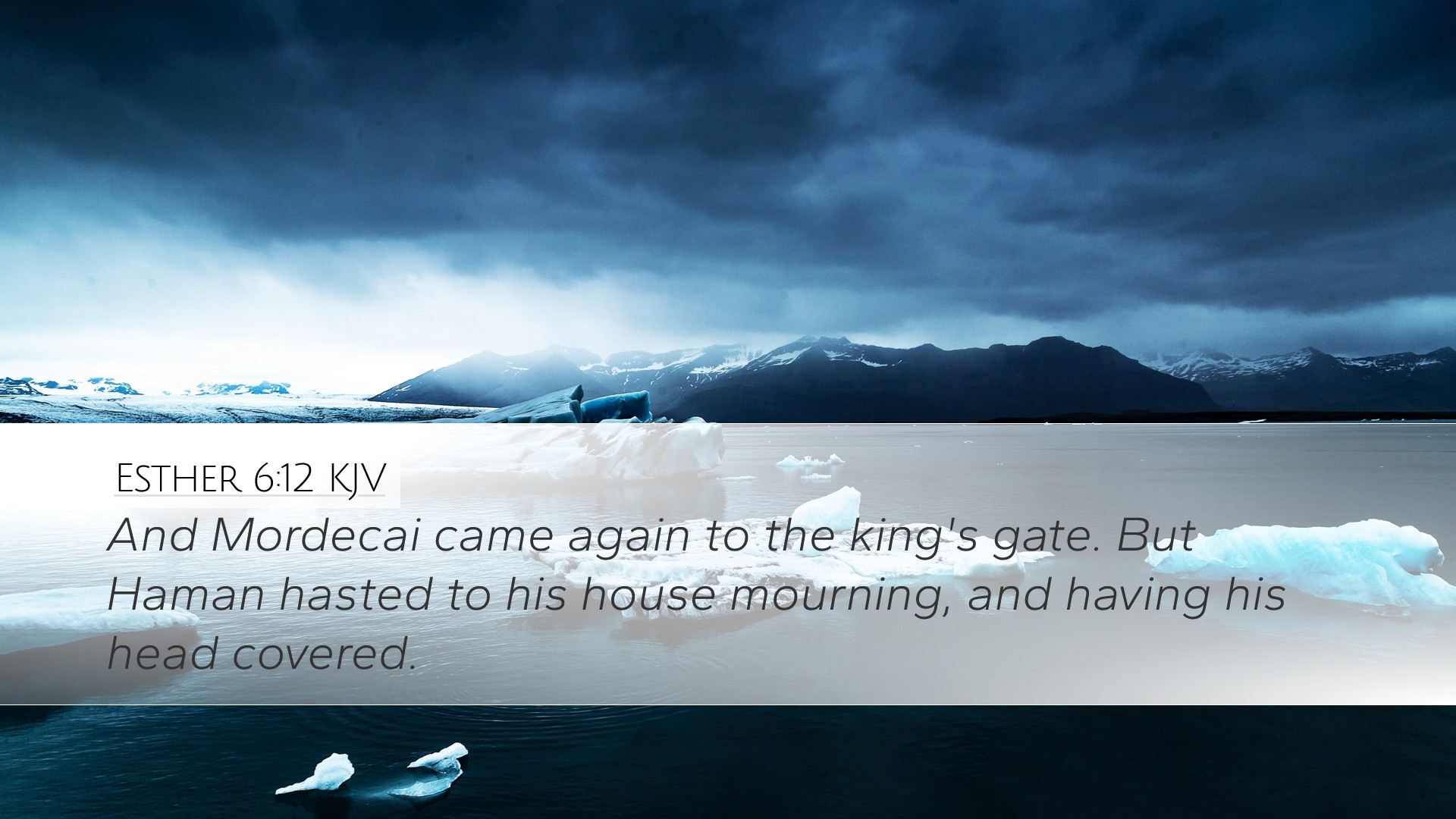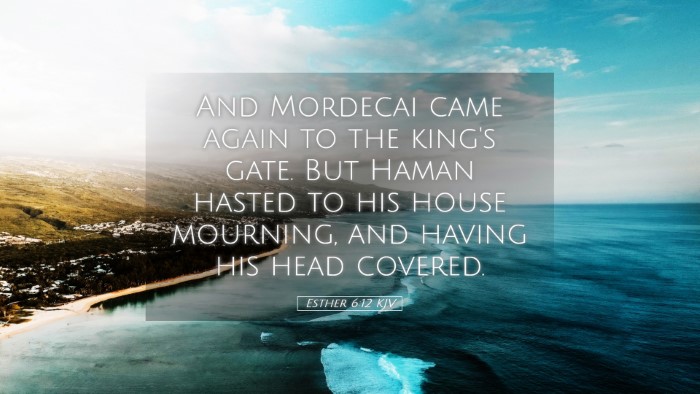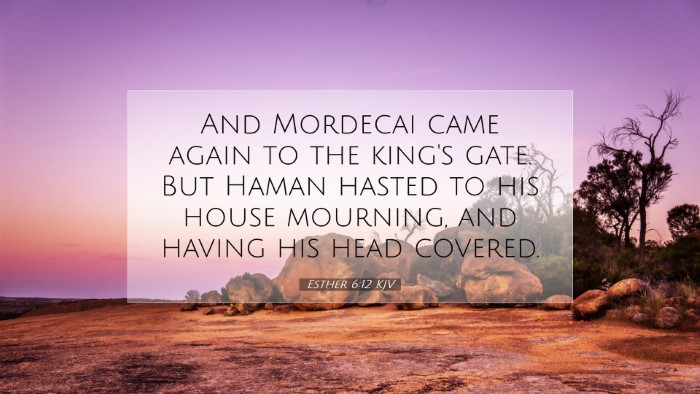Old Testament
Genesis Exodus Leviticus Numbers Deuteronomy Joshua Judges Ruth 1 Samuel 2 Samuel 1 Kings 2 Kings 1 Chronicles 2 Chronicles Ezra Nehemiah Esther Job Psalms Proverbs Ecclesiastes Song of Solomon Isaiah Jeremiah Lamentations Ezekiel Daniel Hosea Joel Amos Obadiah Jonah Micah Nahum Habakkuk Zephaniah Haggai Zechariah MalachiEsther 6:12
Esther 6:12 KJV
And Mordecai came again to the king's gate. But Haman hasted to his house mourning, and having his head covered.
Esther 6:12 Bible Commentary
Esther 6:12 - Commentary and Insights
Esther 6:12 states: "And Mordecai came again to the king's gate. But Haman hasted to his house mourning, and having his head covered." This verse concludes a pivotal moment in the unfolding narrative of the Book of Esther, a story rich with themes of providence, justice, and reversal.
Contextual Overview
The events leading up to this verse involve Haman’s pride and ambition. He had just been publicly honored due to a suggestion from the king, although this honor was meant for Mordecai, the man he loathed. This moment underscores a turning point, indicating how God’s providence can overturn human intentions.
Historical Background
The Book of Esther is set during the Persian Empire, and its characters navigate a world filled with political intrigue. The feasts, royal decrees, and personal vendettas are emblematic of the socio-political climate. Haman, a high-ranking official, plots against the Jews, which sets the stage for the narrative's escalation.
Thematic Insights
- Providence in Reversal: The sudden shift from honor to humiliation for Haman illustrates the theme of divine providence. As Albert Barnes notes, God often uses the pride of the wicked against themselves, leading to their own downfall.
- The Role of Humility: Mordecai’s return to the king’s gate symbolizes a faithful servant’s resilience amidst adversity. Matthew Henry emphasizes that true honor in God’s eyes often does not align with worldly accolades, suggesting that humility and faithfulness to God’s call are of utmost importance.
- Mourning and Shame: Haman’s mourning signifies the weight of his actions. Adam Clarke points out that such mourning is not merely for personal loss but reflects an internal conflict and realization of impending doom. Haman's shame is potent as it foreshadows his downfall.
Character Analysis
Mordecai: In this passage, Mordecai's return to the king's gate after his public honor stands as a testament to his character. He embodies the qualities of steadfastness and resilience. He continues to engage in the life surrounding him, showcasing that he remains rooted in service and duty.
Haman: Haman’s reaction is a stark contrast; his haste to leave and mourn indicates a man whose pride has been wounded. His character illustrates the peril of hubris, as he momentarily rises only to fall tragically. This portrayal warns against the perils of ambition devoid of integrity.
Lessons for Spiritual Leadership
For pastors and spiritual leaders, this verse offers several key takeaways:
- Pride Before Fall: Leaders must remain vigilant against pride and the temptation of seeking personal glory. Just as Haman’s downfall was precipitated by his arrogance, spiritual leaders are reminded to approach their roles with humility.
- The Importance of Faithfulness: Mordecai’s unwavering commitment to his responsibilities exemplifies what it means to be a faithful leader. His actions encourage leaders to remain steadfast, regardless of the circumstances they face.
- Trust in Divine Timing: The events that lead to this moment remind readers that God's plans may unfold in unexpected ways, urging faith and patience in uncertain times.
Application for Theological Reflection
The narrative invites theological reflection on God's sovereignty and human agency. How do we understand the interplay between divine providence and human actions? This account serves as a profound illustration of how God orchestrates events for His glory, often using imperfect vessels.
Discussion Questions
- What does Haman's fall teach us about the consequences of pride in today’s church context?
- In what ways can we cultivate a spirit of humility in our leadership roles?
- How does the narrative of Esther inspire you to trust in God’s timing during challenging circumstances?
Conclusion
Esther 6:12 captures a moment of profound reversal, reflecting the broader themes of justice and divine providence woven throughout the biblical narrative. As believers engage with this text, they are invited to reflect on their own lives, the nature of their leadership, and their faithfulness amidst trials.
In summary, the insights from public domain commentaries by Matthew Henry, Albert Barnes, and Adam Clarke collectively enrich our understanding of this pivotal verse. They offer a profound exploration of the consequences of pride, the nature of true honor, and the omniscient guidance of God in the lives of His people.


